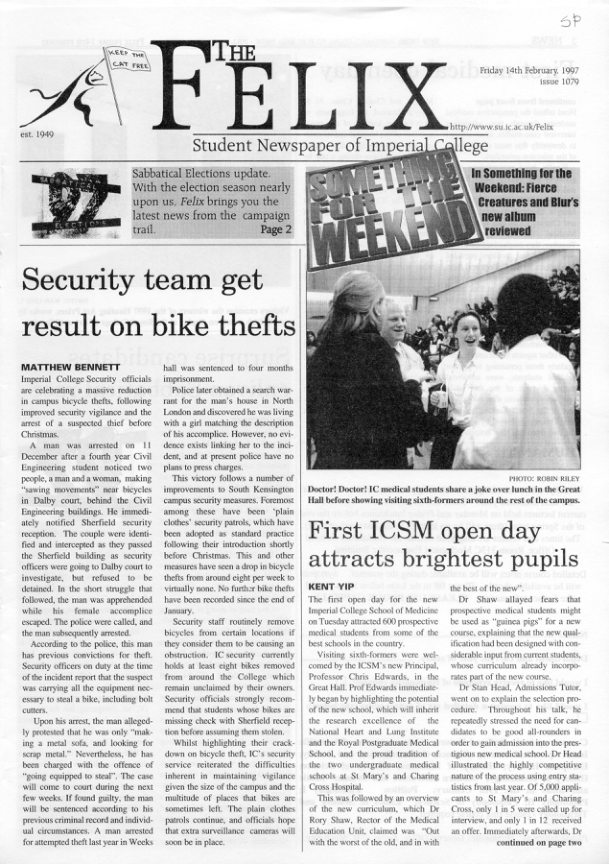Westminster Eye - Hamish Common
One area of public spending doesn’t seem attract much interest from students, apart from the odd comment that in a modern society we don’t really need one any more: Britain’s Armed Forces.
The arguments for a serious rethink on our defence forces are strong. The annual budget stands at Ł24 billion, enough for a quite a lot of hospitals and schools. It employs a few hundred thousand people, plus countless others in industries including arms and aeronautics companies. There will certainly be people reading this who will be going into such industries themselves. The broad question of arms is a horrendously complex one, not made any easier by the emotional issues attached to it. Arms companies are usually pacifists’ and socialists’ Enemy No 1, with the supply of totalitarian and repressive regimes regarded with justified disgust - although I wonder how many people from Imperial who were offered a highly paid job with one of them would turn it down for these reasons.
Labour’s Defence Spokesman, David Clark, has been quietly agreeing with most of Government defence policies. Labour has a political legacy including policies for partial or complete destruction of our nuclear arsenal, swingeing cutbacks in all three forces, leaving NATO and so on. This is all now considered too dangerous, and Labour have recently kept quiet on the subject. Clark has said a few things though: membership of NATO, maintaining Trident (our nuclear submarine fleet) and our permanent seat on the UN Security Council will all be "non-negotiable".
I believe the general argument for axing vast portions of the Armed Forces goes something like this: in a modern society, we do not need these weapons of war. No-one is likely to attack us - we now enjoy close relations with Germany, the last country we fought within our borders. But anyway if they do the United States will help us out, and we’ll keep something in reserve just in case. Many people may not say this openly but feel in their heart of hearts that this is the case.
Unfortunately, the world doesn’t really work like that. Since the collapse of Communism, the standard East versus West confrontation has been replaced by a much more complicated situation, with instability and power vacuums in countless areas across the world. It is vital that a country with enormous world interests such as the UK does not seek solace in itself - every time relatively powerful countries become isolationist, ignoring the affairs of others, foreign powers will see what they can get away with. Hitler took over most of the European continent this way - Russia invaded Afghanistan this way, Argentina invaded the Falklands this way, and the fighting factions in Bosnia consistently tested NATO’s patience to the limit this way. I am not arguing that world order would collapse if we scrapped a few missiles, but that we must show the world quite clearly that we won’t watch on the sidelines while atrocities are committed and islands and areas of the world under British rule - who wish to remain British - are attacked. This clear attitude lies at the forefront of our nuclear policy. The world knows that Britain has at least one submarine afloat with the capability to launch an attack on any part of the world at any time. This would make anyone considering using chemical or biological weapons against British troops, or considering attacking the UK mainland itself, think twice.
Let us say this or an incoming Government accepted these broad terms: how could they cut defence? Even a 5% cut would release billions of pounds. Unfortunately they are finding it very difficult to cut anything. Trident is practically paid for, so scrapping it would kill off a major part of the UK’s personal defence without any pecuniary advantage. The same can be said of Eurofighter - an essential project if only to show that countries other the States are capable of building hi-tech weaponry. All forces have been cut to the bone, with observers commenting that we would not have the resources to launch another Falklands operation. More adventurous ideas have been suggested: merging the Royal Marines with the Army, scrapping the RAF (!) and merging them with Naval and Army air arms. We could lose the tanks - attack helicopters do the job just fine. We don’t need long range bombers - cruise missiles will fit the role quite nicely.
Although such suggestions may cause hernias in defence chiefs and invite ridicule from various quarters, tough decisions will have to be made. Industry bosses and trade unions will lobby strongly against any cuts, with some places employing tens of thousands of people on one (albeit large) site. But even the milder plan for more European integration could save Ł3 -Ł4 billion pounds annually. As John Reed of ‘Defence Industry’ says: "the risk is that in trying to get the best of both worlds they will end up with the worst of both, and that the real day of decision will be postponed."





